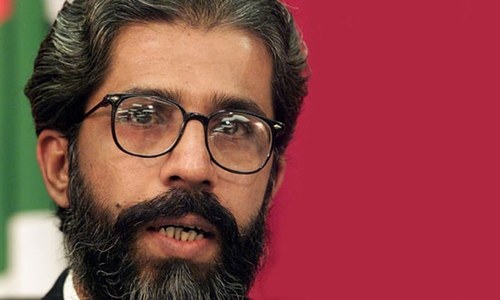An Islamabad anti-terrorism court (ATC) on Thursday ruled that Muttahida Qaumi Movement (MQM) founder Altaf Hussain ordered the killing of the party's senior leader Dr Imran Farooq, who was was stabbed to death outside his home in London in September 2010.
According to Judge Shahrukh Arjumand, during the trial of three arrested accused it was "proved that Altaf Hussain ordered the killing of Dr Imran Farooq".
The court handed life imprisonment and imposed a fine of Rs2 million on three men — Shamim Khalid, Syed Mohsin Ali and Moazzam Ali — and directed them to pay Rs1m each to the deceased doctor's family.
In its judgement, a copy of which is available with Dawn.com, the court said that "it is expected from governments of Pakistan and UK that absconders [MQM founder Altaf Hussain, Iftikhar Hussain, Mohammad Anwar and Kashif Kamran] will be traced, arrested and brought before court as soon as possible."
The court ruled that two senior party leaders based in London "conveyed Hussain's orders to the relevant people in Pakistan". The court said it had found that accused Moazzam Ali, another senior member working at Nine Zero (the headquarters of MQM in Karachi) and accused Khalid Shamim engaged accused Syed Mohsin Ali and Kashif Khan Kamran to execute Farooq.
"The two executors were properly facilitated who went with the sole purpose to London for committing the murder and as per pre-planned conspiracy, an innocent person was brutally murdered.
"The act of abettors and executors was preconceived with a design to intimidate and overawe the public in general and workers of MQM in particular so that in future no one can raise voice against Altaf Hussain, the leader of MQM," the judgement stated.
"The motive thus for murdering Imran Farooq upon the orders of Altaf Hussain and other senior [MQM] leadership is proved because of his [Imran Farooq's] strong position and services in the party."
The court observed that Dr Farooq's notes, written and signed by him in 2008, showed that he feared he would be killed on the pretext of trying to become number one in the MQM. "Existence of that threat also figures in the two confessional statements made by accused and further more Khalid Shamim while directly referring to a conversation with his leader Altaf Hussain states that Altaf Hussain told him that no one can be his number 2, 3 or 1 ½ what to say of number one."
Joint investigation by two countries
The judgement termed the case "historical in nature" as an agreement was made between two sovereign countries for sharing documentary evidence.
The British High Commissioner to Pakistan Dr Christian Turner said that the conviction "marked a team effort between law agencies in the UK and Pakistan working together to get justice for the murder of Dr Imran Farooq".
A statement from the British High Commission said that the conviction came about after a "ground-breaking piece of collaboration" between the two countries, which allowed evidence gathered by the Metropolitan Police to be shared with Pakistani prosecutors and be presented as part of their case and used in the successful prosecution of Mohsin Ali Syed.
The trial proceedings in the case concluded on May 22. The proceedings had been at a standstill since last year as the prosecution case was stuck up because of non-availability of evidence.
In 2018, the Islamabad High Court had directed the ATC to conclude the much-delayed trial by October 2018. However, the prosecution of the Federal Investigation Agency repeatedly requested the court for extension of the deadline since the British government was reluctant to share evidence related to the murder fearing that the accused might get death sentence if convicted.
Two suspects in the case — Shamim and Mohsin Ali — recorded their confessional statements before a magistrate, saying Dr Farooq was killed because he was a "potent threat to the leadership of the MQM".
However, they later backtracked from their confessional statements, saying they had recorded the previous statements under coercion.
Farooq, a senior leader of the MQM, was murdered outside his home in London in 2010.
Who was Imran Farooq?
Dr Imran Farooq is considered as one of the key figures who laid the foundation for the All Pakistan Mohajir Students' Organisation (APMSO), which eventually turned out to be a forerunner of the MQM.
During the early 1980s, the APMSO was converted into a fully fledged political party to advocate the cause of the Urdu-speaking populace, mainly in Karachi and other parts of urban Sindh.
With Altaf Hussain as its leader, the bespectacled Farooq was appointed secretary general of the party. He was also regarded as one of the main ideologues and the brain behind education of the party cadre.
When in 1992 Hussain went into self-imposed exile in the wake of a military crackdown, Farooq went underground in Karachi, running the party from hiding. Although he was declared absconder by the then government, he continued to dodge the authorities.
Eventually he managed to slip out of the country on a fake passport and under an assumed name. After arriving in London, he applied for political asylum.
In the initial years he was one of the main players who helped Hussain oversee the party's restructuring from London.
However, differences emerged a few years later, sending Farooq into obscurity. Since then he had been living the life of a recluse, with no role in party affairs.
In 2015, Altaf Hussain was also formally booked in Farooq's murder case.
Hussain is also facing terrorism charges in Britain, which are related to an incendiary speech relayed from UK to his followers in Pakistan on August 22, 2016. He was charged in October, 2019.
Additional reporting by Naveed Siddiqui.


!["The motive thus for murdering Imran Farooq upon the orders of Altaf Hussain and other senior [MQM] leadership is proved because of his [Imran Farooq's] strong position and services in the party," reads the judgement. — AFP/File "The motive thus for murdering Imran Farooq upon the orders of Altaf Hussain and other senior [MQM] leadership is proved because of his [Imran Farooq's] strong position and services in the party," reads the judgement. — AFP/File](https://i.dawn.com/primary/2020/06/5eeb5283f0466.jpg)














































